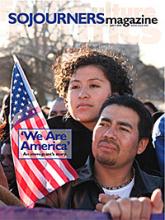I was visiting a church at which pentecostal practices were gaining traction, bringing no small controversy with them. “If these new movements conflict with scripture,” declared the pastor, “we will choose scripture every time.” It was unclear just what perceived threat the charismata posed to the church’s biblicist orthodoxy.
Eugene Peterson doesn’t address holy laughter or slayings in the spirit in Eat This Book. But he does express an anxiety that any spirituality not based primarily in language will weaken Christians’ commitment to the Bible. This attitude distracts from what is primarily a solid, accessible study of biblical reading.
The book is really three books crammed into one. Peterson details an approach to reading scripture for true nourishment and formation—like John and the angel’s scroll, not just reading but consuming the text—rather than the validation of particular doctrines. Simultaneously, he establishes a secondary, very different thesis—that the sort of spiritual reading he advocates is in fact the proper foundation for any expression of Christian spirituality. Later, Peterson turns abruptly to the topic of biblical translation, culminating in a compelling (if tangential) look at the making of his excellent and hugely popular colloquial-English paraphrase, The Message.
Peterson’s starting point is his sense that “there is an enormous interest these days in the soul … but there is not a corresponding revival of interest in our Holy Scriptures.” He makes a strong case for such a revival, arguing that the Bible offers a continuous narrative in which we are privileged to participate. Drawing heavily from Karl Barth, Peterson insists that we must not apply scripture to our own lives and circumstances but instead acknowledge that the Bible demands we engage reality on terms not our own.
Read the Full Article
